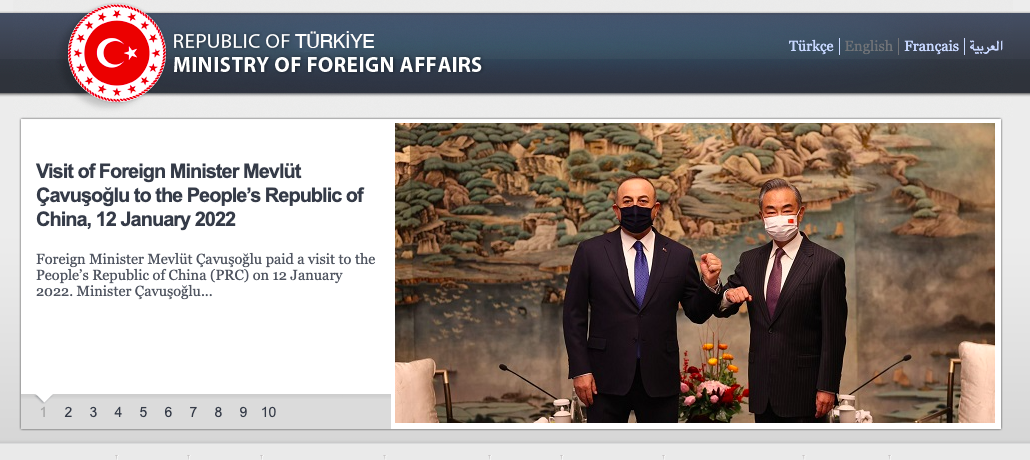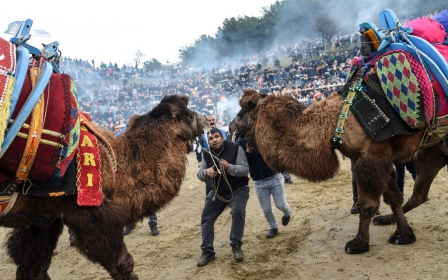Turkey to register its new name Türkiye to UN in coming weeks

The Turkish government is planning to change its internationally recognised official name in English to Türkiye by registering it to the United Nations in coming weeks, two Turkish officials told Middle East Eye.
The government could change the name with a simple notification to the UN registry but the letter "Ü", which isn’t in the nominal Latin alphabet, could be a problem. Türkiye means Turkey in Turkish.
One senior Turkish official said Ankara hadn't discussed the "Ü" issue with the UN yet, but the source was hopeful that a solution could be found. Some observers said one such remedy could be using "U" instead of "Ü" in the new name.
“The exact timing for the name change is still under consideration by the government,” one senior Turkish official told MEE. “But the process is ongoing.”
A UN spokesperson told MEE that Turkey had contacted them on the prospective name change.
“The Turkish Permanent Mission has got in touch with UN Protocol to check about the procedure to communicate a change of country name in case this change happens, but we had not received any official communication,” the spokesperson said.
The name change drive began in December after Turkish President Recep Tayyip Erdogan released a memorandum and asked the public to use Türkiye to describe the country in every language.
“Türkiye is accepted as an umbrella brand for our country in national and international venues,” Erdogan said. “Türkiye is the best representation and expression of the Turkish people’s culture, civilization and values.”
Erdogan, in the same memorandum, advised companies to use “made in Türkiye” instead of “made in Turkey” for their exported goods. And he also instructed the state agencies to use Türkiye in their correspondence, especially with international organisations, instead of Turkey, Turkei and Turquie.
Initially, the Turkish public hadn't known how seriously to take the initiative. However, publicly funded news networks quickly followed the government's lead.
Anadolu news agency and TRT World now use “Türkiye” in their English-language broadcasts. One TRT World article tried to explain its reasoning by referencing an English dictionary: "Flip through the Cambridge Dictionary and "turkey" is defined as "something that fails badly" or "a stupid or silly person".
The foreign ministry, meanwhile, wasted no time. Its website now welcomes visitors with a “Republic of Türkiye” title. Turkish foreign missions all around the world now also use “Türkiye” in their correspondences.
The people who support the name change say it is all about Turkey’s sovereignty and how it feels better with Türkiye.
Meryem Ilayda Atlas, a journalist and board member of TRT, says that digitalisation made it easier for everyone to use “Türkiye” in English.
“Expressing yourself outside the confines of English is a global trend,” she told MEE. “Türkiye is a very old name that has a meaning for us. Now thanks to technology there is no such technical issue to use Türkiye in English texts. In the past the computers wouldn’t recognise it."
Other than Ankara having the sovereign right to call itself whatever it wants, Atlas points to another reason for the change:
'Xenophobic, Islamophobic attacks often liken Turkey to the turkey bird. Preserving a country’s reputation is very important'
- Meryem Ilayda Atlas, journalist
“Xenophobic, Islamophobic attacks often liken Turkey to the turkey bird,” she said. “Preserving a country’s reputation is also very important.”
Indeed, Turkish students are all familiar with the issue as they learn English. And Turkey being a bird has been a sore point for many Turks for decades.
A Turkish historian, who spoke anonymously due to his affiliation with a public institute, said that there have been no efforts in the past to change the country’s name.
“You could see some criticism in the press about how westerners define Turkey with a bird in the 1930s,” the historian said. “But there has been no official initiative to do something about it, since the name has been the same for centuries in Europe, long before the Ottoman Empire's collapse, the Italians called the area Turkey."
The common historical narrative laid out nearly 50 years ago to NPR by Mario Pei, a Columbia University professor of Romance languages, suggests two scenarios to explain how this bird was associated with Turkey.
The first posits that merchants, mostly from Istanbul, shipped the bird to Britain from America in the 1500s. The British referred to it as a “Turkey coq” since it was wholesaled out of Turkey. At the time, there was a habit of relating anything that goes through Turkey or Turkish merchants to "Turkey". For instance, Persian carpets were called Turkey rugs and Indian flour was called Turkey flour.
The second theory suggests the Europeans, long before the discovery of America, had a wild fowl they liked to eat that came from Guinea in West Africa through Turkish merchants. The fowl was nicknamed “Turkey coq” because it was traded through Istanbul, which was called Constantinople at the time.
So when British settlers arrived in Massachusetts Bay and discovered their first American woodland fowl with different characteristics of a larger size, they still called it turkey.
Retired Ambassador Unal Cevikoz, an MP and a senior member of main Turkish opposition party CHP, believes there is no need to be sensitive about Turkey’s association with a bird.
“We also associate that bird in Turkish with India and call it Hindi,” he told MEE. “I think it is a waste of time."
Atlas, the journalist, counters that Turkish people never make fun of India in the way westerners ridicule Turkey in viral videos or images associated with the bird.
But there are arguments for keeping the old spelling, Cevikoz says: Turkey has been used by the West to describe the country for centuries. “What are we going to do? Are we going to use Türkiye in Russian, which isn’t using the Latin alphabet, as well?”
Cevikoz argues that every country has its own name that is used locally. “Greece calls itself Hellas. Armenia is Hayastan. Switzerland is Helvetica,” he said. “But none of them is trying to change their name in English.”
Introducing the name to the international arena is one thing - convincing everybody else to use it is another. In 2016, the Czech Republic shortened its name to Czechia, but it has never really caught on.
Burma's name was changed to Myanmar by the military junta in the 1990s, and today some argue that using the new name is implicit support for the military.
Atlas says all former Yugoslavia states had a smooth transition to their new names, and even Macedonia changed its name to North Macedonia after a protracted argument with Greece. “If there is a will, changing it isn’t very hard,” she said.
Cevikoz, the retired ambassador, says Turkey established itself as a brand long ago and there is no need to change it. “Turkey is among the five top tourist destinations all around the world, everyone knows it,” he said. “You can strengthen a brand by changing the impression it leaves on the public.”
The Turkish Presidency Communications Directorate last week launched a new campaign with an advertorial, “HelloTürkiye”, to introduce the change to the wider public.
Translation: Türkiye strengthens its own self and identity in language and communication as in every field! "Türkiye" not "Turkey". For Türkiye #helloTürkiye!
Fahrettin Altun, communications director at the presidency, told media that Ankara will also establish a Türkiye brand office to strengthen the new name.
“We can strengthen the Türkiye trademark through total solidarity around the world,” Altun said, calling on civil society, media and academia to support the cause.
The Turkish historian, however, disagrees. “This is a waste of time. We should focus on other areas that matter,” he said.
In any case, a Turkish etymology dictionary, prepared by Armenian-Turkish intellectual Sevan Nisanyan, says Türkiye’s origin lies in Italian or French.
“Türkiye is an adaptation from Italian 'Turchia' or French 'Turquie', which means Turk’s country,” the dictionary says. “This word was produced from Türk proper noun.”
This article is available in French on Middle East Eye French edition.
Middle East Eye delivers independent and unrivalled coverage and analysis of the Middle East, North Africa and beyond. To learn more about republishing this content and the associated fees, please fill out this form. More about MEE can be found here.







